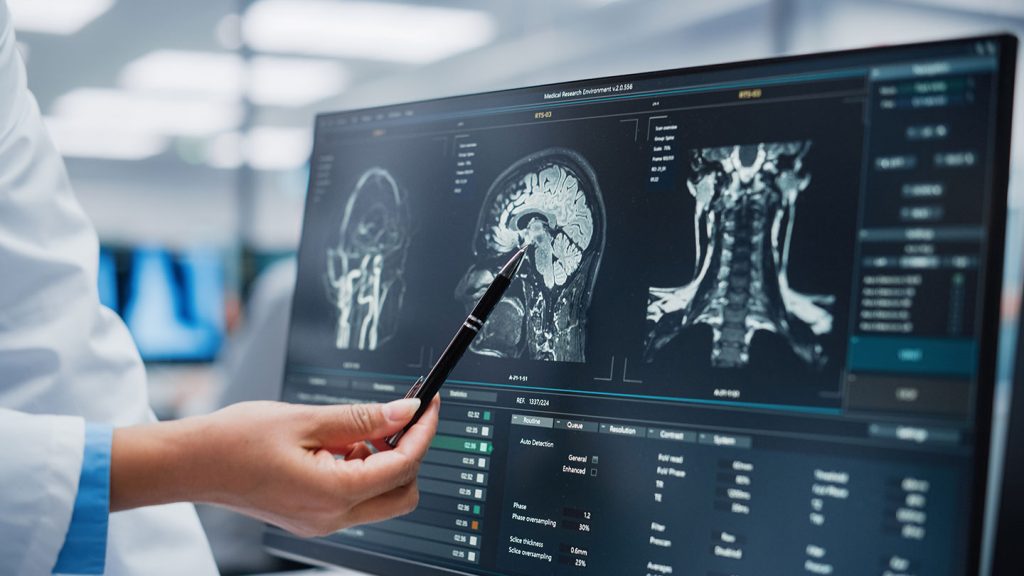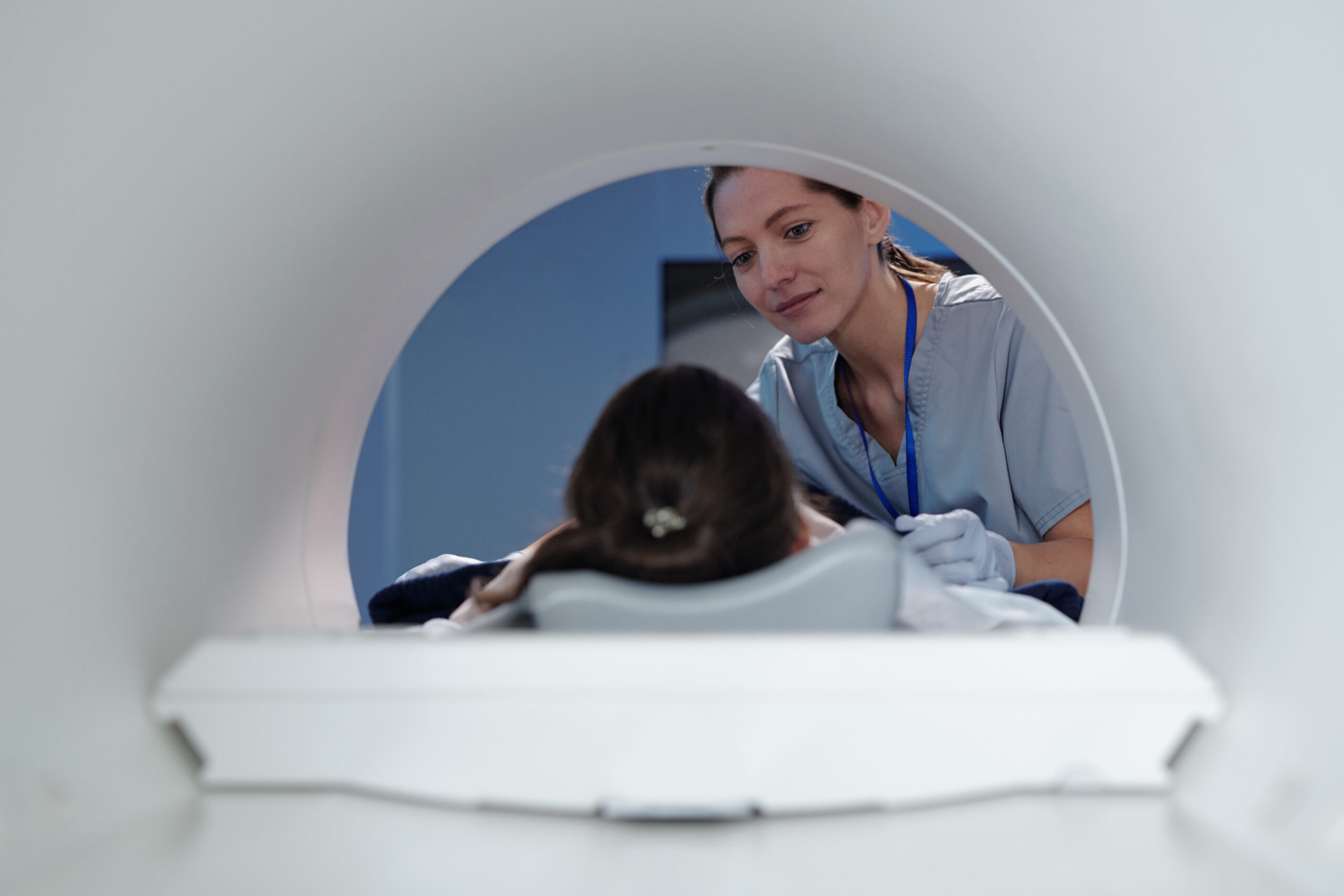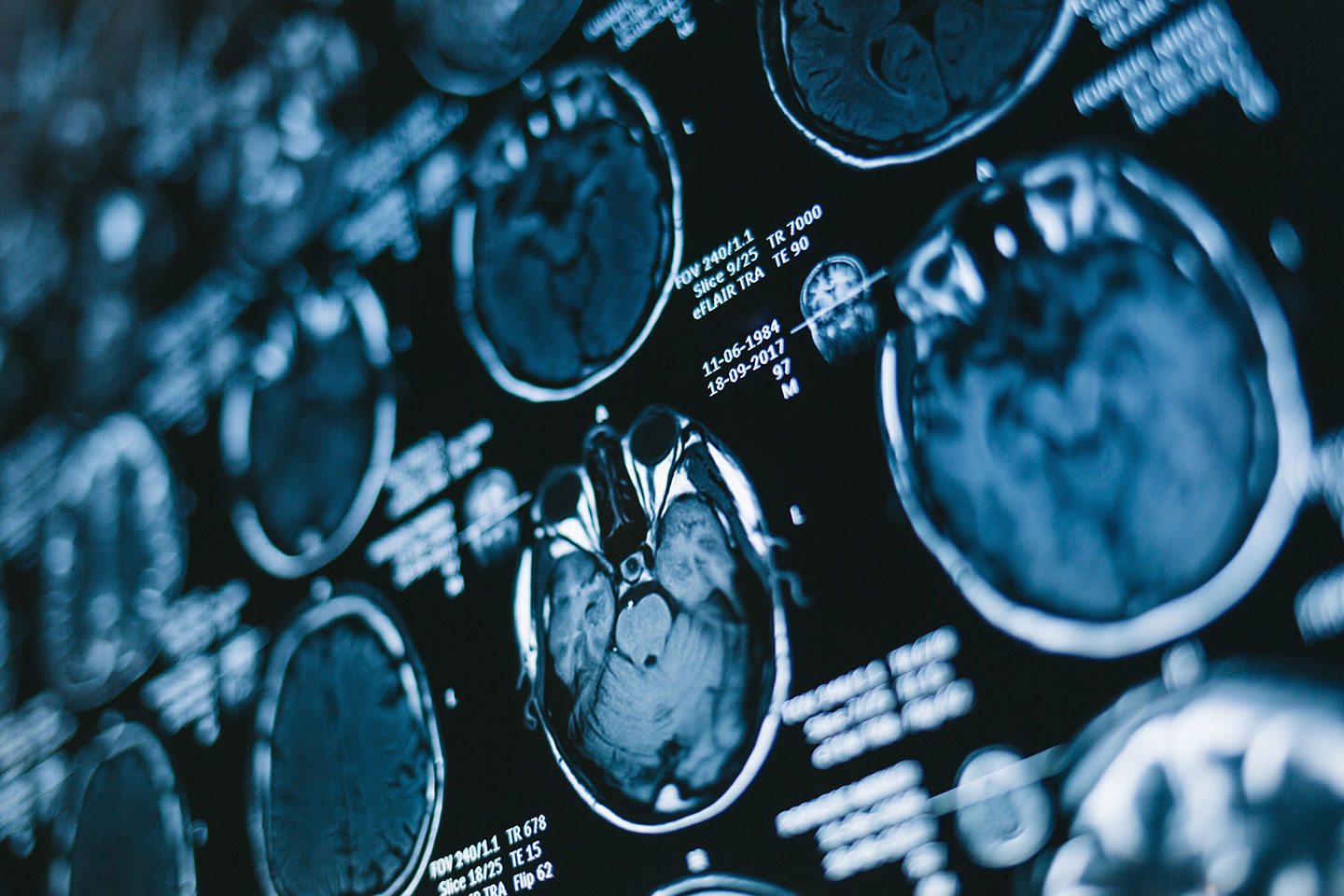What is an MRI?
MRI, short for Magnetic Resonance Imaging, is a type of scan that uses strong magnets and radio waves to create detailed images of the inside of your body. Think of it like a camera that can look deep into your body without needing any X-rays. When you lie in the MRI machine, it interacts with the water molecules inside you. This interaction is captured by the machine and transformed into highly detailed images, which can show everything from muscles and bones to organs.

Our MRI Services
Cardiac MRI
A Cardiac MRI provides a detailed view of the heart’s structure and function. It’s commonly used to assess the function of the heart, detect scarring that may have occurred due to a previous heart attack, identify inflammation (myocarditis) and diagnose cardiomyopathies (such as cardiac amyloid or sarcoidosis). Cardiac MRI has been extensively evaluated around the world and has many benefits over other techniques such as ECHO. This non-invasive scan offers precise insights, assisting in tailored treatment plans for optimal cardiac health.
Musculoskeletal MRI
A musculoskeletal (MSK) MRI examines various structures of the body, including bones, joints, muscles, tendons, ligaments, cartilage and soft tissues. It’s ideal for diagnosing various forms of arthritis, tears in muscles, tendons and ligaments, soft tissue tumours and bone lesions, and infections in the bone or soft tissue. MSK MRI is often the gold standard test for diagnosis of a troublesome MSK complaint.
Brain and Spine MRI
A Brain and Spine MRI is a safe, painless test that uses strong magnets and radio waves to create detailed images of your brain and spinal cord. This scan helps doctors detect conditions like tumours, strokes, and nerve compression in the spine, which can lead to pain or numbness.
Prostate MRI
A Prostate MRI is a safe, advanced imaging test that uses strong magnets and radio waves to create highly detailed pictures of the prostate. Known as the gold standard for prostate cancer detection, this scan helps doctors identify and assess any suspicious areas without the need for invasive procedures.
Abdominal and Liver MRI
An Abdominal and Liver MRI creates precise images of the abdomen, including the liver, and is especially valuable for identifying liver diseases, tumours, or inflammation. It provides a non-invasive way for doctors to detect issues and monitor treatment progress. With its ability to show soft tissues clearly, MRI is an essential tool for assessing abdominal health and spotting problems early.
Aortic MRI
An Aortic MRI provides detailed images of the aorta, the main artery carrying blood from the heart to the rest of the body. This scan is especially useful for assessing conditions like a bicuspid aortic valve (AV) and identifying any abnormalities or areas of weakness in the vessel walls. With precise imaging, it allows doctors to evaluate aortic health and plan appropriate treatments or monitoring strategies.
MRCP (Magnetic Resonance Cholangiopancreatography)
An MRCP (Magnetic Resonance Cholangiopancreatography) focuses on creating detailed images of the bile ducts, gallbladder, and pancreas. It is particularly useful for detecting issues like gallstones, blockages, or inflammation in these areas. MRCP provides doctors with a clear view of the biliary system without the need for invasive procedures, aiding in accurate diagnosis and treatment planning.
Our MRI scanner
When it comes to ensuring the best care for our patients, we invest in the latest and most advanced technology. That’s why we utilise the PRISMA MRI scanner by Siemens Healthineers. This state-of-the-art 3T (3 Tesla) MRI machine provides clearer, high-resolution images, allowing us to get a detailed view inside your body.
What does this mean for you?
Using the latest in MRI technology allows us to deliver more accurate diagnosis, shorter scanning times, and an overall more comfortable experience. At our facility, we’re committed to combining top-notch technology with our expert care, ensuring you receive the best medical attention available.

Why Book an MRI with GXU?
We perform all scans on a Siemens 3T Prisma. This is an advanced research MRI.
Founded in 2008, we have established ourselves as a trusted radiology provider.
Our team are passionate about radiology, and are committed to providing high-quality imaging for precise and accurate reports.
We are an accredited practice, affiliated with HDAA and the Royal Australian and New Zealand College of Radiologists, ensuring the highest standards of practice.
All reports are completed by specialists and made easily accessible, so your healthcare provider can receive timely, accurate insights.
We’re here when you need us most, offering same day appointments for urgent examinations.
MRI Fees
Unfortunately the Australian Government does not allocate Medicare rebatable licences to new regional MRI scanners. For this reason, GXU charges a subsidised out of pocket fee for our MRI services in order to provide our patients with the most advanced 3T MRI technology.
Standard MRI fees are around $265, however please ask our friendly team for more information about our MRI fees.

Where we Operate our MRI Services
Our MRI services are centrally located in Newcastle using the state of the art facilities at the Hunter Medical Research Institute (HMRI), located behind John Hunter Hospital.
Free, separate on site parking is available for patients driving to their appointment, or if you’re walking, catching public transport or being dropped off, entry is via the Skybridge.
Upon arrival a member of the team will meet you at the ground level ‘Staff Entry’ or follow the pathway to the Ground Level ‘Visitor Entry’ and take the lift to the Level 4 Reception.

What Our Customers Say
EXCELLENTTrustindex verifies that the original source of the review is Google. Was very happy with how professional everyone was. Dr was so gentle with cortisone injection. I found the staff be be polite and caring. Would highly recommendTrustindex verifies that the original source of the review is Google. Staff were very friendly and professional. My Biopsy was painless with every step explained. Could not have asked for better care. I highly recommend GXU.Trustindex verifies that the original source of the review is Google. I was running late and they still fit me in. Explained the procedure thoroughly. All staff were amazing. Thoroughly recommend.Trustindex verifies that the original source of the review is Google. The staff were great the waiting time was good I had a good experience there with no complaints at allTrustindex verifies that the original source of the review is Google. Greeted by friendly and professional staff who talked through the MRI process in detail and made it as comfortable as possible throughout.Trustindex verifies that the original source of the review is Google. Staff were friendly, polite and helpful. I had a ct scan guided injection in my back and the procedure went smoothly and was pain free. Highly recommendTrustindex verifies that the original source of the review is Google. Staff were courteous, professional and kind. It was an overall a good experience and I will definately go there again.Trustindex verifies that the original source of the review is Google. Friendly efficient, caring, they always go beyond to get you into an earlier appointment if they canTrustindex verifies that the original source of the review is Google. The experience attending this clinic is second to none. The care and treatment is patient centred. Everyone is so lovely, warm and welcoming from the moment you walk in the door. Best experience I have had attending a radiology clinic in years. Highly recommend 😊
Book an MRI Today
To book an MRI, click the button below, or get in touch on 02 4999 6499 to speak to one of our team at our Thornton clinic.
Frequently Asked Questions
How Does an MRI Scan Work?
When you arrive for your MRI, you’ll be asked to remove any metal objects, like jewellery or glasses, since the MRI uses strong magnets. You might be given a hospital gown to wear.
Once ready, you’ll lie down on a special table that slides into the MRI machine, which looks like a large tube. The radiographer will operate the machine from a separate room but will be able to communicate with you through a speaker. It’s important to stay still during the scan to get clear images. You’ll hear some loud knocking or buzzing sounds – that’s just the machine working.
How long does an MRI scan take?
An MRI scan can last anywhere from 15 minutes to over an hour, depending on what part of the body is being imaged. After the scan, you can go back to your normal activities straight away.
When do I get the results of my MRI scan?
Once your MRI has been completed, a radiologist will complete a report and will send this, as well as the images, to your referring doctor. This will usually take a couple of days. We encourage you to review your results with your doctor, where you can obtain a copy of your MRI report for your records.
Can I book an MRI without a referral?
To have an MRI, you’ll require a referral. This can be from a GP, Specialist or Allied Health professional. When making your appointment, we’ll request that you send us a copy of your referral, so that we can confirm the length of time needed for your appointment, the cost of your MRI, and whether any preparation may be required.



